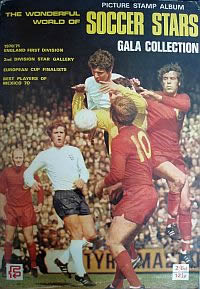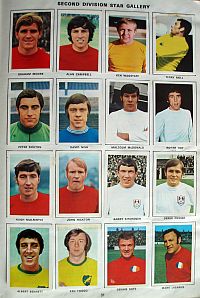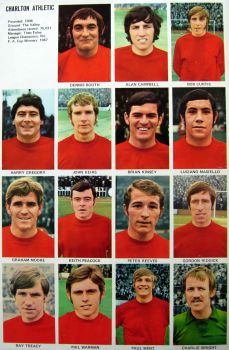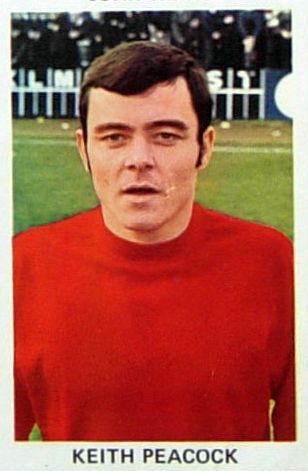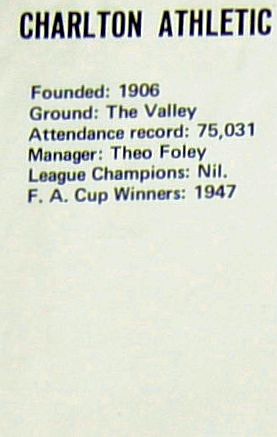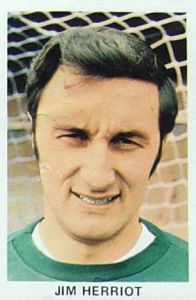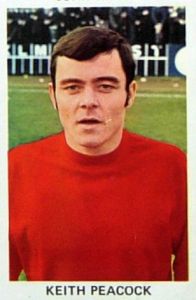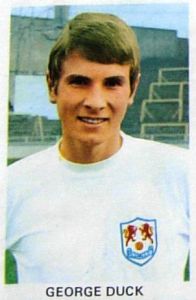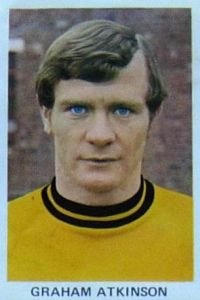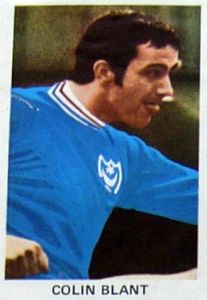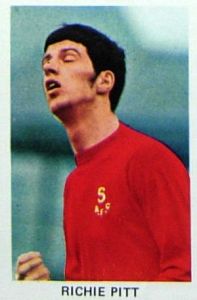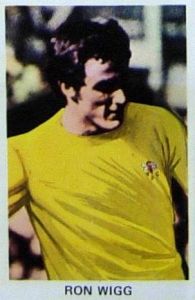The Managers
The team summaries on each sheet included the Manager of the team at the time. These were:
Birmingham (finished 9th)
Freddie Goodwin 1970 - 1975
Replaced Stan Cullis at the beginning of the season after the latter's retirement. Responsible for first picking Trevor Francis at the age of 16.
Blackburn Rovers (finished 21st)
Eddie Quigley 1967 - 1970
Had already been replaced by club General Manager Johnny Carey by the start of the season, with the two men effectively swapping jobs. Both men were sacked following Blackburn's relegation at the end of the season. (Carey was famously sacked in the back of a taxi, which led to the phrase 'Taxi for xxx' meaning the person was on the way out of the club.)
Bolton Wanderers (finished 22nd)
Nat Lofthouse 1968 - 1970
Club legend Lofthouse was one of three managers during 1970/71 as Bolton finished bottom of the table. Jimmy McIlroy had a few weeks in charge followed by caretaker boss Jimmy Meadows who lasted just 81 days before General Manager Lofthouse took over again.
Bristol City (finished 19th)
Alan Dicks 1967 - 1980
Just 33 when he took over the club, Dicks led them to the First Division and kept them there for 4 years - their most successful spell since the early 1900s. Many fans felt he should have been allowed to stay at the club following the relegation as the team were subsequently relegated in the following two seasons as well.
Cardiff City (finished 3rd)
Jimmy Scoular 1964 - 1973
Despite failing to win the first 12 games when he first took over, Scoular took Cardiff to their best finish since the early Sixties when they just missed out on promotion to the First Division by three points. Cardiff won the Welsh Cup seven times under him so were regular contestants in the Cup Winners Cup including a semi-final place to make them the most successful Welsh side to have played in Europe.Things didn't go so well after 1970/71 and Scoular was replaced by Lew Clayton.
Carlisle United (finished 4th)
Bob Stokoe 1968 - 1970, 1980 - 1985 and 1985 - 1986
Stokoe is most famously linked with Sunderland but this was his first of three spells as Carlisle manager. He moved to Blackpool at the end of 1970, being replaced by Ian MacFarlane who took the side to 4th - Carlisle's 4th highest League finish.
Charlton Athletic (finished 20th)
Theo Foley 1970-1974
Foley took over from Eddie Firmani for his first job in management but wasn't able to halt the club's decline. Having just escaped relegation in 1970/71 they were not so lucky the following season. Following two attempts to escape from Division Three, Foley was replaced by Mike Bailey who steered them back into the Second Division.
Hull City (finished 3rd)
Terry Neill 1964 - 1973
Neill was just 28 when he was signed as player-manager by Hull from Arsenal.He was also player-manager of Northern Ireland from 1971. He moved on in 1974 to replace Bill Nicholson at Spurs and was succeeded by John Kaye.
Leicester City (finished 1st)
Frank O'Farrell 1968 - 1971
O'Farrell's first season saw Leicester relegated from the First Division but reach the FA Cup Final where they lost to his next employers; Man Utd who he joined after taking Leicester to the Second Division title in 1970/71. He was replaced by Jimmy Bloomfield, who had won the Third Division with Orient the season before.
Luton Town (finished 6th)
Alec Stock 1968 - 1972
Luton had just been promoted from the Third Division and Stock consolidated their position in the Second. He moved to Fulham and was replaced by Harry Haslam who then led the club into the First Division for one season. It has been suggested that Paul Whitehouse based his Ron Manager character on Stock.
Middlesbrough (finished 7th)
Stan Anderson 1966 - 1973
Sandwiched in between Raich Carter and Jack Charlton, it's perhaps not surprising that Anderson is not so well remembered outside the North East. He had been the first player to captain Newcastle, Sunderland and Boro and as a mangaer built the latter up to the point where Charlton then got them promoted to the First Division.
Millwall (finished 8th)
Benny Fenton 1966 - 1974
Billy Gray had taken Millwall from the Fourth to the Second Division in successive seasons and Fenton consolidated their place there over his eight years as manager. Just missing out on a first promotion to the top flight in 1971/72 they were relegated in 1974/75 after he had made way for Gordon Jago.
Norwich City (finished 10th)
Ron Saunders 1969 - 1973
Saunders made his name as a manager in the Midlands but he had previously taken Norwich to the First Division for the first time, as well as a League Cup final. After resigning, he was replaced by John Bond who also took Norwich to the First Division.
Orient (finished 17th)
Jimmy Bloomfield 1968 - 1971
Bloomfield moved from Plymouth to replace George Petchey as (player) manager of Orient. Having won the Third Division in his first season he moved on to replace Frank O'Farrell at Leicester in 1971, leaving Paul Went in charge for 21 days.
Oxford United (finished 14th)
Gerry Summers 1969 - 1975
Oxford had only been a League team for 7 years when Summers took over. Arthur Turner had taken the team from the Southern League to the Second Division and Summers kept them there until he left in 1975.
Portsmouth (finished 16th)
Ron Tindall 1970 - 1973
After a successful end to his playing career with Pompey, he was made manager after George Smityh retired. Finances were bad and he resigned to be replaced by John Mortimore. Between 1968/69 and 1974/75, Portsmouth finished 15th, 16th or 17th each time.
QPR (finished 11th)
Les Allen 1970 - 1973
Having been part of QPR's League Cup winning team when they were a Third Division club, Allen became player-manager following Tommy Doherty's 29 days in charge. He was replaced by Gordon Jago who established QPR as a First Division side throughout most of the 1970s.
Sheffield United (finished 2nd)
John Harris 1959 - 1968 and 1969 - 1973
One of the best managers operating in the Second Division in 1970/71, Gentleman John had already taken the Blades to the First Division but was made General Manager following relegation in 1969, despite his ability to balance the books. When Arthur Rowley was sacked after a poor season, Harris took charge again, winning promotion in 1970/71. Only the 7th manager of United since 1889, Harris resigned and Ken Furphey took over.
Sheffield Wednesday (finished 15th)
Danny Williams 1969 - 1971
Despite master-minding Swindon's League Cup Final success over Arsenal, Williams was unable to bring any magic to Wednesday who were relegated from the First Division at the end of his first season. He was replaced by Derek Dooley who was also unable to stop the eventual slide into the Third Division under Steve Burtenshaw.
Sunderland (finished 13th)
Alan Brown 1957 - 1964 and 1968 - 1972
Childhood fan Brown took over from the long-serving Bill Murray. He made it his job to clean up the club following accusations of illegal payments being made to juniors to persuade them to sign. Despite the club being relegated at the end of his first season, he stuck to his task and got them promoted again in 1964. He then surprised everyone by taking the vacant job at Sheffield Wednesday who he took to the FA Cup Final in 1966. He rejoined Sunderland and they were relegated again, resulting in him being replaced by caretaker Billy Elliott and then Bob Stokoe.
Swindon Town (finished 12th)
Fred Ford 1969 - 1971
Although Swindon finished mid-table whilst Ford was in charge, they did continue previous manager Danny William's knack of doing well in Cups by winning the Anglo-Italian Cup twice. The Board signed Dave Mackay as a player in 1971 with the intention of him taking charge, however the principled Mackay refused to do so until after Ford had been formally dismissed.
Watford (finished 18th)
Ken Furphy 1964 - 1971
Furphy became player-manager following Bill McGarry's move to Ipswich and got the club promoted to the Second Division for the first time in it's history. He left to manage Blackburn in 1971 and bad luck and a lack of money led to Watford's relegation back down the League.
|












